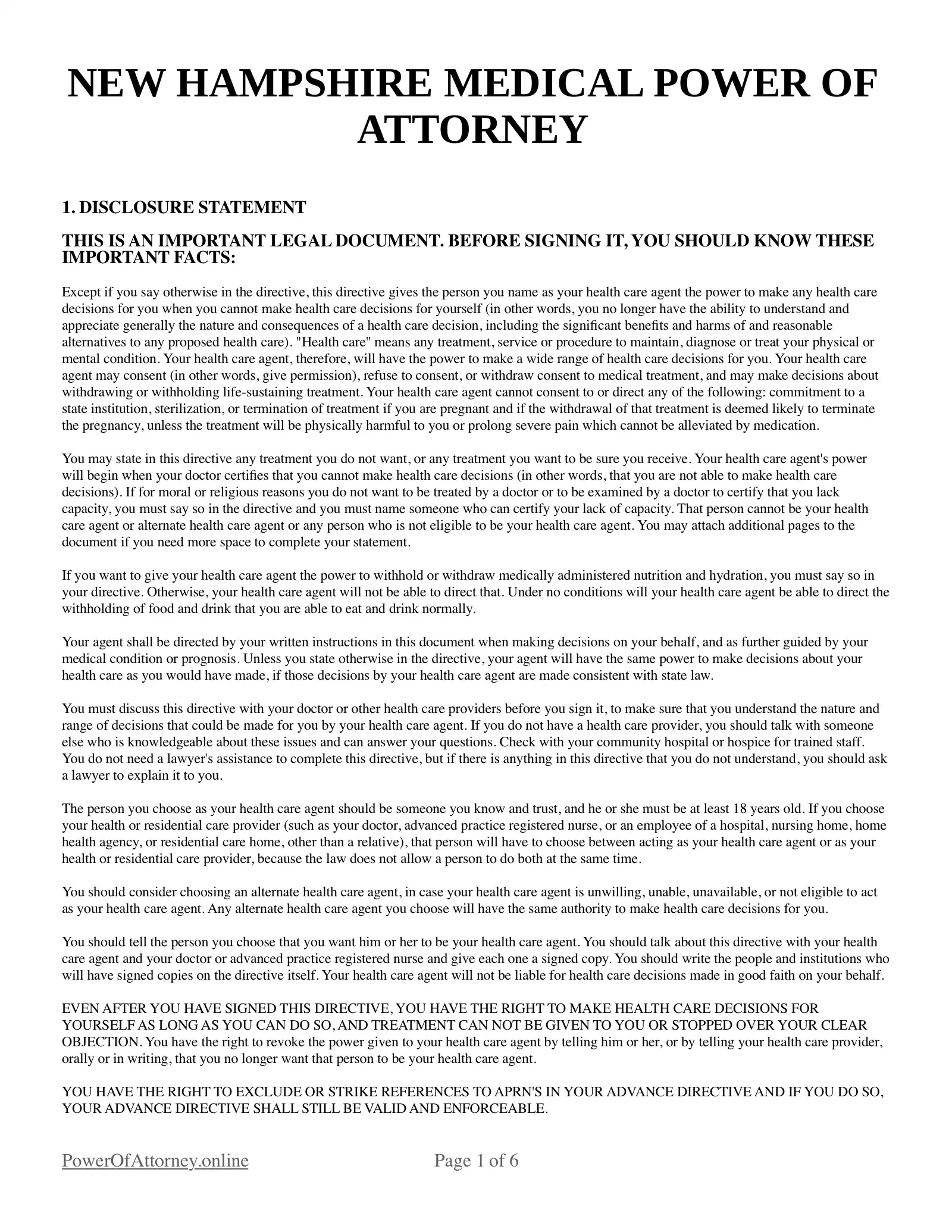Free New Hampshire Medical Power of Attorney Forms
Granting someone power of attorney (POA) on your behalf authorizes them to make decisions for you. They can act as your representative in financial and real estate deals, as well as many other transactions. But if you want your POA agent to also make medical decisions for you after you are incapacitated, you will need a special medical power of attorney form.

New Hampshire Medical Power of Attorney Laws
New Hampshire’s medical power of attorney is distinct from the general power of attorney. Legislation governing the medical power of attorney can be found in the New Hampshire Revised Statutes, Section 137-J.
The law declares, “The state of New Hampshire recognizes that individual persons have the right, founded in the autonomy and sanctity of a person, to control the decisions relating to the rendering of their own medical care” (N.H. Rev. Stat. § 137-J:1).
In New Hampshire, the medical power of attorney is usually included with a living will. Together, they comprise a single document called an Advance Directive. Another term for the medical power of attorney is the durable power of attorney (DPOA) for healthcare since the agent retains authority even after the principal is incapacitated.
You can appoint multiple agents as well as successor agents to bear your medical power of attorney.
Signing Requirements in New Hampshire
Drafting a medical power of attorney form in New Hampshire is simple: you can find free printable templates online that can be customized. However, you will have to get that form signed in the presence of two witnesses or a notary public. It’s advisable to have both during its signing.
There are certain conditions regarding who can serve as a witness during the signing of a medical power of attorney. According to New Hampshire Revised Statutes, Section 137-J:14, witnesses cannot be:
- The principal’s spouse or heir
- The agent or their surrogate
- The principal’s attending practitioner
- The attending practitioner’s employees
- The principal’s residential care provider
- The residential care provider’s employees
How To Write a Medical POA in New Hampshire
There are many good reasons to consider granting someone medical power of attorney. Some of those are:
- You have a terminal illness.
- You are scheduled for major surgery.
- You are elderly.
Someone who has POA over your healthcare acts with your permission even if you become incapacitated or incompetent. You can use an online template and create your own form before having it signed and notarized.
1. Choose your agent and successor agent
It’s important to pick your agent carefully. Make sure you appoint someone you trust with your life because that’s the power they wield with the medical POA. In case your agent is unable to fulfill their duties, make sure to appoint a successor agent who can take up the primary agent’s role in their absence.
2. Define the agents’ limits and authority
As a binding legal document, you must ensure that your medical POA form covers specific details. Currently, your medical POA can make any and all healthcare-related decisions on your behalf. If you would like to put some limitations on that power, it should be specified in your POA form. Once you are happy with the terms of the agreement, you can proceed to the signing stage.
3. Meet the signing requirements
According to New Hampshire law, you need to sign a medical power of attorney form in the presence of at least two credible witnesses or a notary public. Either one of these is enough to grant your POA form a legally binding status. However, to ensure that there are no doubts about the document’s legitimacy, you should do both: bring witnesses and have the form notarized.
4. Make and share copies
Congratulations! Your medical POA form is now official. You should store it safely as it is an important document that will be needed in the future. You should also provide a notarized copy of the form to your agent, who might need to present it as proof while performing their duties.
Giving someone medical power of attorney means you can rest easy knowing that you will be looked after even when you can no longer look after yourself.